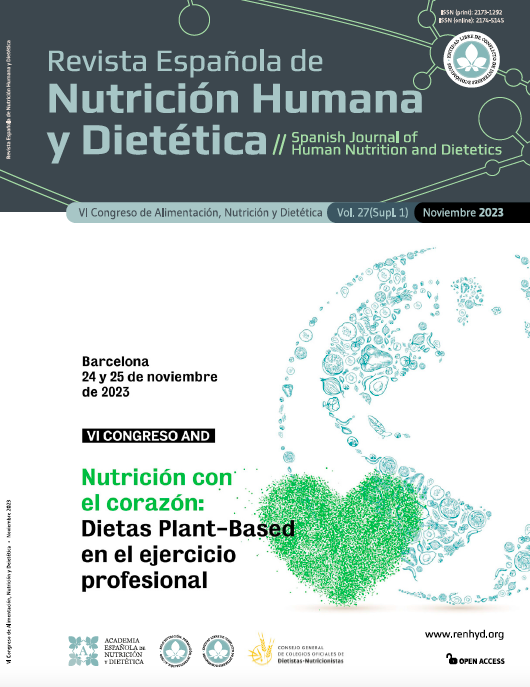Dietas más vegetales, más sostenibles. Evidencias científicas de las dietas plant-based en la salud global
Palabras clave:
-Resumen
-
Citas
(1) Non communicable diseases [Internet]. [citado 17 de enero de 2023]. Disponible en: https://www.who.int/news-room/factsheets/detail/noncommunicable-diseases.
(2) Afshin A, Sur PJ, Fay KA, Cornaby L, Ferrara G, Salama JS, et al. Health effects of dietary risks in 195 countries, 1990-2017: a systematic analysis for the Global Burden of Disease Study 2017. Lancet. 11 de mayo de 2019; 393(10184): 1958-72.
(3) Springmann M, Clark M, Mason-D’Croz D, Wiebe K, Bodirsky BL, Lassaletta L, et al. Options for keeping the food system within environmental limits. Nature. Octubre de 2018; 562(7728): 519-25.
(4) Garnett T. Where are the best opportunities for reducing greenhouse gas emissions in the food system (including the food chain)? Food Policy. 1 de enero de 2011; 36: S23-32.
(5) Sustainable healthy diets.
(6) Martínez-González MA, Sánchez-Tainta A, Corella D, Salas-Salvadó J, Ros E, Arós F, et al. A provegetarian food pattern and reduction in total mortality in the Prevención con Dieta Mediterránea (PREDIMED) study. Am J Clin Nutr. Julio de 2014; 100 Suppl: 320S-8S.
(7) Li H, Zeng X, Wang Y, Zhang Z, Zhu Y, Li X, et al. A prospective study of healthful and unhealthful plant-based diet and risk of overall and cause-specific mortality. Eur J Nutr. 2021; 61(1): 387-98.
(8) Wang X, Ouyang Y, Liu J, Zhu M, Zhao G, Bao W, et al. Fruit and vegetable consumption and mortality from all causes, cardiovascular disease, and cancer: systematic review and dose-response meta-analysis of prospective cohort studies. BMJ (Clinical research ed.). Julio de 2014; 349: g4490.
(9) Satija A, Bhupathiraju SN, Rimm EB, Spiegelman D, Chiuve SE, Borgi L, et al. Plant-Based Dietary Patterns and Incidence of Type 2 Diabetes in US Men and Women: Results from Three Prospective Cohort Studies. PLoS Med. 2016; 13(6): e1002039.
(10) Maroto-Rodriguez J, Delgado-Velandia M, Ortolá R, Carballo-Casla A, García-Esquinas E, Rodríguez-Artalejo F, et al. Plantbased diets and risk of frailty in community-dwelling older adults: the Seniors-ENRICA-1 cohort. Geroscience. 4 de julio de 2022.
(11) Sotos-Prieto M, Struijk EA, Fung TT, Rodríguez-Artalejo F, Willett WC, Hu FB, et al. Association between the quality of plant-based diets and risk of frailty. J Cachexia Sarcopenia Muscle. Diciembre de 2022; 13(6): 2854-62.
Descargas
Publicado
Cómo citar
Número
Sección
Licencia
Derechos de autor 2023 Mercedes Sotos Prieto

Esta obra está bajo una licencia internacional Creative Commons Atribución-NoComercial-CompartirIgual 4.0.











